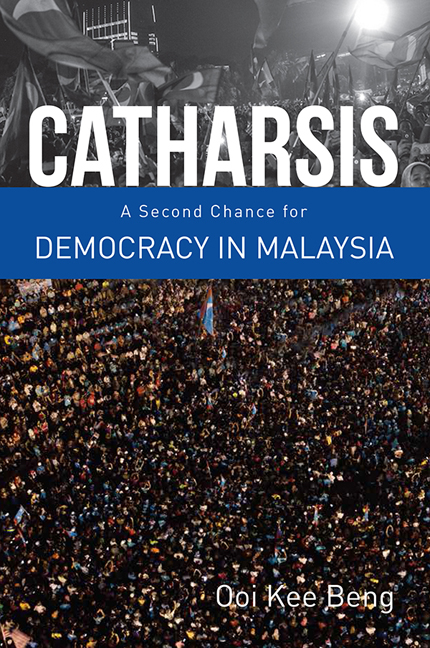Book contents
- Frontmatter
- Contents
- Foreword
- 1 Introduction – Malaysia's Future Is Redeemed
- Before Pakatan Harapan
- Before 9 May 2018
- 12 Racialising the Un-racialisable: What Is the Red Shirt Rally All About?
- 13 One Country's Merdeka Is Another's Damage Control
- 14 Malaysia – Where Politics Must Be Ethnically Inclusive and Exclusive at the Same Time
- 15 Is Malaysia at a Crossroads or in a Quagmire?
- 16 Unity Without Solidarity Sows Disunity
- 17 UMNO and Looking Back at History
- 18 Sarawak Forces Federal Opposition to Do Deep Soul-searching. But Can It?
- 19 By-elections Reveal New Malay Politics
- 20 Interview with Mahathir Mohamad: ‘People Must Be Able to Hold Their Heads Up.’
- 21 Malaysia Has to Start Re-examining Its Histories
- 22 Waves from US Probe into 1MDB May Turn into Tsunami
- 23 Seeking a New Formula to Unite Malaysia's Diversity
- 24 Time for Anwar to Accept Mahathir's Olive Branch?
- 25 Najib, Mahathir and the Timing of Malaysia's Polls
- 26 Excessive Governance Is Not Good Governance
- 27 Why Malaysia's Opposition Will Take to the Streets Again
- 28 Merdeka is About The Individual, Too
- 29 A Battle Between Malay Leaders Over Malaysia's Future
- 30 The Primacy of Political Economy in Asia
- With Mahathir at the Helm
- Beyond 9 May 2018
- About the Author
27 - Why Malaysia's Opposition Will Take to the Streets Again
from Before 9 May 2018
Published online by Cambridge University Press: 12 February 2019
- Frontmatter
- Contents
- Foreword
- 1 Introduction – Malaysia's Future Is Redeemed
- Before Pakatan Harapan
- Before 9 May 2018
- 12 Racialising the Un-racialisable: What Is the Red Shirt Rally All About?
- 13 One Country's Merdeka Is Another's Damage Control
- 14 Malaysia – Where Politics Must Be Ethnically Inclusive and Exclusive at the Same Time
- 15 Is Malaysia at a Crossroads or in a Quagmire?
- 16 Unity Without Solidarity Sows Disunity
- 17 UMNO and Looking Back at History
- 18 Sarawak Forces Federal Opposition to Do Deep Soul-searching. But Can It?
- 19 By-elections Reveal New Malay Politics
- 20 Interview with Mahathir Mohamad: ‘People Must Be Able to Hold Their Heads Up.’
- 21 Malaysia Has to Start Re-examining Its Histories
- 22 Waves from US Probe into 1MDB May Turn into Tsunami
- 23 Seeking a New Formula to Unite Malaysia's Diversity
- 24 Time for Anwar to Accept Mahathir's Olive Branch?
- 25 Najib, Mahathir and the Timing of Malaysia's Polls
- 26 Excessive Governance Is Not Good Governance
- 27 Why Malaysia's Opposition Will Take to the Streets Again
- 28 Merdeka is About The Individual, Too
- 29 A Battle Between Malay Leaders Over Malaysia's Future
- 30 The Primacy of Political Economy in Asia
- With Mahathir at the Helm
- Beyond 9 May 2018
- About the Author
Summary
Mass demonstrations are a strategic forcing of an issue to a head. This is definitely so in the case of Malaysia's Bersih 5 rally planned for 19 November. As its name reveals, this is the fifth street protest in a series.
Organised by a huge assemblage of civil society bodies, the first Bersih (Malay for ‘clean’) street march held on 10 November 2007, directly and simply called for clean and fair elections. That day, at least 30,000 yellow-shirted demonstrators turned up, with some having to endure chemical-laced water cannons for their troubles.
That demonstration turned a page in Malaysian politics and in the evolution of the country's civil society activism. It precipitated a political avalanche that almost swept the long-ruling Barisan Nasional (BN) coalition out of power in federal elections held the following year. The impetus continued, but again in the 2013 elections, the BN managed to cling on to power.
Bersih 5 goes beyond calling for clean elections and is instead a public show of outrage over how badly democracy has deteriorated in Malaysia. But unlike 2007, the diversity of forces arrayed behind it this time reflects the difficulties critics of the BN have faced in trying to dislodge a government they consider to have lost its moral mandate to rule.
Prime Minister Najib Razak's government, as a consequence of its weak position, has in the last few years applied a string of legal, paralegal, institutional and political means to silence powerful opponents. These have been surprisingly effective.
When he took power in 2009 in a party coup, Datuk Seri Najib's initial profile as leader was to reconcile traditional Malay-first aficionados with those gathered around former deputy prime minister Anwar Ibrahim who was preaching good governance as the cure-all for the country's many political ailments. Not only did Mr Najib fail to live up to this promise, his time in power has seen a worrying approval – and instigation – of dangerous expressions of racism and religious extremism.
In the general election of May 2013, Mr Najib had – albeit half-heartedly – focused his attention on winning back the Chinese electorate. After his narrow victory in those polls – no thanks to that electorate – he had asked angrily: ‘Apa lagi Cina mahu?’
- Type
- Chapter
- Information
- CatharsisA Second Chance for Democracy in Malaysia, pp. 95 - 98Publisher: ISEAS–Yusof Ishak InstitutePrint publication year: 2018



